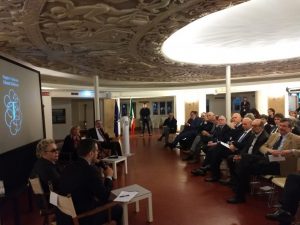CULTURE Minister Bussetti: “We are extremely proud of the Italian translation of the Talmud”
“The past is always present within us and we must keep reliving it. We must keep interpreting it, in accordance with the teachings of Judaism and of the Babylonian Talmud,” Marco Bussetti, the Italian Minister of Education, said during the presentation of the Talmud Translation Project at the Museum of Science and Technology in Milan last week.
The project was set up by a memorandum of understanding between the Italian Presidency of the Council of Ministers, the Italian Ministry of Education, the National Research Council (CNR), the Union of Italian Jewish Communities (UCEI) and the Italian Rabbinical College.
“This is a one-of-a-kind translation project, which we Italians must be proud to be promoting and carrying out,” stated Bussetti. “We will carry on financing it, and we have already boosted funds significantly, because we have high hopes on it. It is the only cutting-edge research program of this type on the international stage. This way, we can combine our near-present, which is artificial intelligence, with our roots, which are the past.”
The same idea has been reiterated by Clelia Piperno, the director of the Talmud Project, who also pointed out the uniqueness of the initiative. Then, she remarked that Italy is the only country to have this kind of project, which is the product of scientific and humanistic work and has required translators and computer experts to design a unique software capable of translating the Talmud from Jewish and Aramaic into Italian.
Moreover, the software will be used to translate texts from other languages, as it was explained by UCEI vice president Giorgio Mortara and CNR president Massimo Inguscio. “Talmud means ‘studying’”, noted the Chief Rabbi of Milan, Rabbi Alfonso Arbib, who joined the meeting, “but studying also means learning how to study, by asking questions, and thinking. The Talmud teaches how to think.”
The importance of the Talmud, a fundamental text for the Jewish tradition, was also stressed by Rabbi Gadi Piperno, quality manager of the Project. “The Talmud provides the reader with a variety of questions as well as possible answers regarding countless subjects, ranging from workers’ rights to health. In addition, the Talmud presents a specific method of study: since there is no ‘ipse dixit’, everything is to be questioned.”
The Rabbi also explained how the software can perform “unprecedented text analyses with computational linguistics.” Therefore, translation is becoming a very useful tool for both Judaism and Italy on many levels: it allows to rediscover one’s own roots by reading a book which was banned and burnt for centuries, as well as giving new possibilities in terms of study and interpretation of the Talmud and of other ancient texts.
“We are grateful to the Italian institutions for the essential support in carrying out this major project involving knowledge and technological innovation” claimed the Israeli ambassador to Italy, Ofer Sachs. “People will finally be able to read the extraordinary texts fundamental for Jewish culture, religion and philosophy, thanks to the implementation of sophisticated translation programs based on artificial intelligence. I am sure that the incredible technology used for translating such difficult texts represents a universal chance for promoting both knowledge and intercultural exchange.”
The Director-General of the National Museum of Science and Technology, Fiorenzo Galli, shared these words of hope and reminded the audience of the initiatives to celebrate the 500 years from the birth of Leonardo Da Vinci. “He managed to establish a dialogue between past and present, just like the Talmud does.”
Minister Bussetti also mentioned the past during his speech, stating: “There have been partial translations of the Talmud before, but they were marked by prejudice which has affected negatively our theological thinking and national culture and which is amongst the causes of the racial laws of 1938 and of the persecution of the Jews by fascists, the Shoah, which have brought about indelible shame.” Then, he added: “Rhetoric doesn’t help distance us from this past. We need constant, passionate, deep commitment, which, amongst others, is represented by the Talmud Translation Project.”
The Head of the Department of Higher Education and Research of the Italian Ministry of Education, Giuseppe Valditara, also joined the event, together with Rita Cucchiara, Professor at the University of Modena and Reggio Emilia, and Maria Cristina Messa, Dean of the University of Milano-Bicocca.
Translated by Simone Simonazzi, with the help of Sara Facelli, both students at the Advanced School for Interpreters and Translators of Trieste University and interns at the newspaper office of the Union of the Italian Jewish Communities.

